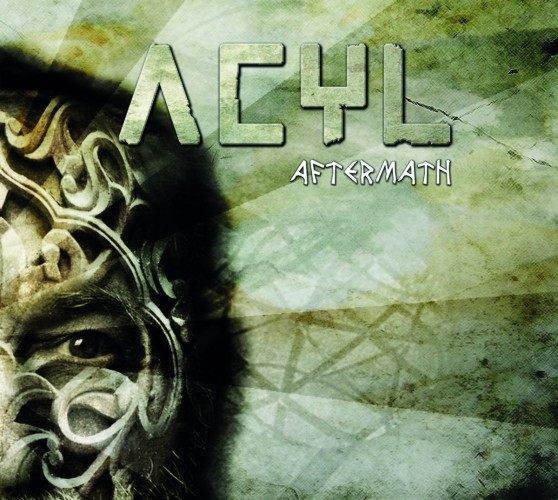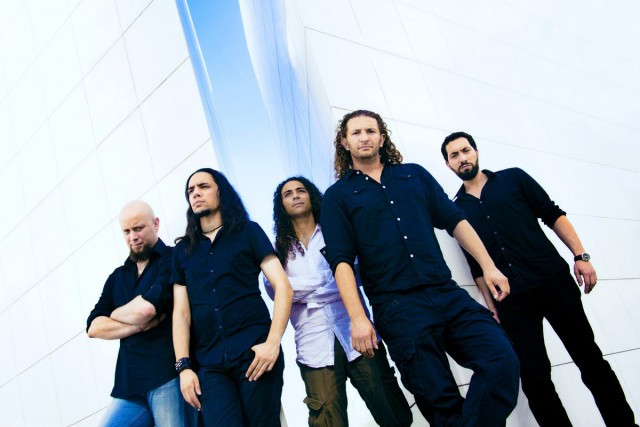(Our long-time New Zealand supporter and occasional guest writer Booker reviews the new album by the Paris-based band Acyl.)
Back in 2012, Islander put out a request for fellow readers to pitch in a review or two while he was otherwise occupied. One of the belated efforts I offered was a review of Acyl’s Algebra album, which I’d been cranking on high rotation since randomly discovering it some months earlier in the nether regions of the internet (it’s amazing what you’ll find back there!). That post was one of my first here at NCS, and just like a bad case of herpes I’ve kept coming back ever since. So long, in fact, that Acyl have had time to tour, hit restart on the writing process, orbit the sun a few times, and record and release a follow-up album: Aftermath, which came out at the start of the month.
Aftermath is a concept album, telling the story of the French band’s homeland, Algeria. The cover art done was by one of the band’s guitarists, Reda, with the band stating: “The cover represents a random Algerian character carrying a mask which symbolizes the weight of ages of history, tradition, values, fears, achievements, doubts and certainties. A mask that protects him and confines him at the same time… the whole cover expresses the consequence of thousands of years of struggle and quest for inner peace.”
Just like good metal based on literature makes me want to read books and become all scholarly (https://www.nocleansinging.com/2013/12/05/metal-meets-literature/) this is an album that makes me wish I knew more about history, and particularly Algeria’s tumultuous past. In fact, from what I can gather, tumultuous would be an understatement: the region appears to have been subject to constant war, shifting borders, and the tentacles of imperial interests for a great part of recorded history; fitting subject matter then for a metal album.
The album kicks off with “Numidia”, the name of the kingdom spanning the northern coast of Africa in the first few centuries B.C. From the first few bars it’s obvious the unique sound Acyl brought on Algebra is still with us. I’m not even entirely sure what the instruments are which form the opening notes in the album (my guess is a guellal is in there), but a look over the album credits reveals an array of instruments which will leave you reaching for your browser’s search bar: derbouka, guellal, gasba, karkabou, gumbri, bendir, udu, oud, as well as a host of guest appearances in the traditional choir sections.
The vocal approach continues along the same lines as their previous releases, formed by a mix of different styles: the heavy vocals are reminiscent of a New Wave of American Heavy Metal sound, rather than a typical death metal growl. Mixed in are spoken/barely-sung word sections, some form of traditional Arabic/Algerian singing, and melodic cleans.
Following “Numidia”, the first half of the album follows with songs of similar dynamics: “Mercurial” and “Gibraltar”, which alternate between heavy and lighter moments before hitting the bounce and swagger of “Finga”, a song which also ties in a few samples from the Algerian movies “L’opium et le baton” (1971) (http://www.imdb.com/title/tt0328223/) and “Patrouille à l’Est” (1971) (http://www.imdb.com/title/tt0856254/).
The next track “Son of Muhieddine” breaks down the tempo, forming a largely softer track with harmonised group chants, and the strangely foreboding calm delivery of the line “now it’s time to claim what we have lost and take it back again”. And that lyric heralds in the album’s sixth track, “The Battle of Constantine”. “The Battle” is probably the most typically “metal” track on the album, with a rapid-fire machine gun riff making an appearance towards the end, and a few 2/4 bars thrown in for good measure just to put a little off-kilter twist into the momentum.
“Tin Hinan” draws back on the tempo again, with a few minutes’ build-up before alternating for the rest of the song between mid-paced heavy and milder sections.
The album largely draws to a mellow finish, with “Gaetuli” following a similar structure and pace to “Tin Hinan”. The one-two combination of quieter tracks “Equanimity” and “Pride” feel like one single closing act, with “Equanimity” a largely flute-based track, and “Pride” sounding almost like it could be a North African lullaby.
Conceptually, the album seems to focus mainly on a period of 300-400 years, beginning around 200 B.C, the time of Numidia in the opening track, through the Jugurthine and Punic wars where the native Berber and Gaetuli tribesman fought Roman conquest (if my amateur interpretation and understanding is correct).
With all the chants, spoken-word, and clean, harmonised vocals, this is definitely a break from the rule at NCS, and certainly a step down in heaviness from the bands usually filling these pages. It’s not the kind of music that will float everyone’s boat, but if you feel like taking a sidestep from the black, and setting sail in the direction of Algiers, then this may be just what you’ve been looking for.
As with any metal, you don’t really need to understand what the band’s singing about in order to appreciate the album, but in my case a cursory read over a few pages on The Font of All Human Knowledge and a few other sites helped enrich the experience and put some of the lyrics in context. Acyl have a recurring lyric on “The Battle of Constantine”: “it’s not about controlling the masses”. But they have succeeded in creating a soundtrack to control and dominate my earholes for just short of an hour. And for that, I thank them.
For anyone lucky enough to be in Paris in November, Acyl are playing with Ihsahn (details here). Below is the video for “Gibraltar”, along with a full album stream.
Facebook: https://www.facebook.com/AcylOfficial/
Bandcamp: https://acylband.bandcamp.com/album/aftermath



This certainly has a unique flavor to it. I’ll have to give it a few more spins.
I think they’ve got unique covered alright, which can be quite an achievement in itself these days. Just hearing the different sounds and musical approach is probably the key drawcord for me. In all honesty I’d probably like them more if they went even heavier on the heavy. But you know, they’re not here writing music just for me